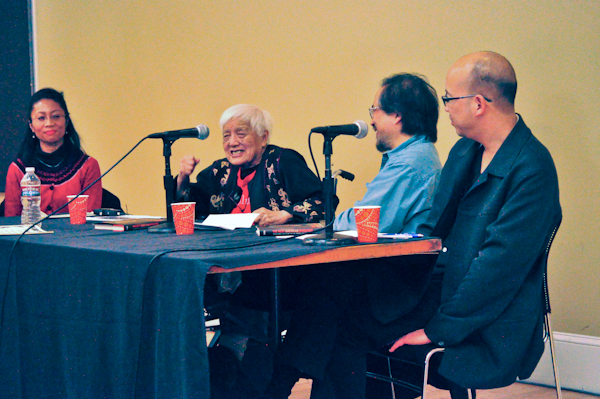“We can’t just be active,” said social activist Grace Lee Boggs to a group at the Black House Community Room Thursday afternoon. “We’ve got to be philosophical activists.”
Boggs came to Stanford as part of a co-sponsorship between the Asian American Activities Center (A3C), Okada House and the Stanford Institute for Diversity in the Arts (IDA) for an event entitled, “The Next American Revolutionary.” The event was named after her latest book, “The Next American Revolution: Sustainable Activism in the 21st Century,” of which she signed copies after the event.
Scott Kurashige, co-author of Bogg’s book, and David Palumbo-Liu, director of the Stanford Asian American Studies Program, served as moderators.

Boggs’ legacy as an activist spans more than 70 years–she was involved with most of the 20th century’s major social movements, including the labor, civil rights, black power, women’s rights and environmental justice movements.
Boggs said the best way to make a change on institutional issues in our modern world is to reimagine ourselves, the institutions and revolution itself.
Boggs focused her discussion on her activist work in Detroit, her hometown, and on the lack of jobs in both Detroit and the nation. The solution, she said, is not the creation of more jobs she described as having “mangled us and made us into machines,” but instead a revolution based on reimagining.
“We thought we could compensate for our dehumanization at work by our consumption,” Boggs said, “Reimagining revolution means reimagining jobs that make us human.”
Boggs also spoke about education issues and how “we need to see young people as the solution and not part of the problems.”
She advocated a more horizontal relationship between students and teachers and a community-based education that maximizes student creativity.
“Reimagining education means relating to our children in a more human way,” Boggs said.
Monica Vu ‘14, who attended as part of Palumbo-Liu’s Comparative Fiction of Race and Ethnicity class, said Boggs’ concept of revolution as reimagining and her emphasis on community struck a chord.
“I’ve been to conferences; I’ve tried to promote issues that pertain to Asian American activism but no one’s every really addressed them as pointedly as [Boggs] has,” Vu said. “She talks about making something of yourself and affecting your community through your own means without discounting what leaders can do.”
Kurashige echoed Boggs’ idea of a more visionary form of activism and said that the book aims to share these ideas and observations from their work in Detroit as a way to start dialogue.
“It’s not just that we need to go out and protest all the things that we think are wrong and all the people that we think are in charge of the country,” Kurashige said. “What we really need to do is develop a new vision that goes along with creating new actions that will bring about the potential transformations we need in terms of ourselves, our communities and our institutions.”
IDA Executive Director Jeff Chang wrote in an email to The Daily, “There are a lot of Grace Lee Boggs’ fans and followers on the Stanford campus and in the larger community, so it made perfect sense for us to try to bring her here to speak.”
Chang went on to say that IDA was interested in the way Boggs talks about culture as a vehicle to shift people’s values toward inclusivity, sustainability and freedom, and how she doesn’t exclude culture from politics.
“She argues that the arts and artists play a crucial role in transforming their communities and their world–that cultural change precedes political change,” Chang wrote. “That is IDA’s founding philosophy in a nutshell.”